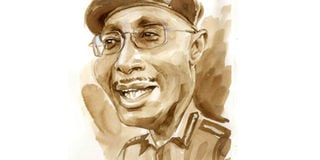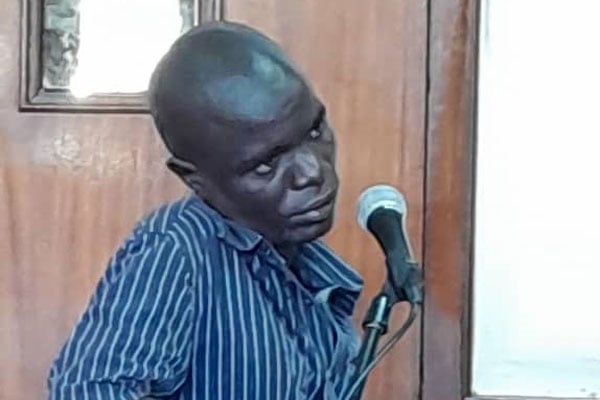Prime
MPs bark at Kayihura but fail to bite the strong general

What you need to know:
Irony. The IGP has been criticised for condoning institutional impunity by not punishing his officers implicated in extra-judicial killings. By endorsing him for a third term, the legislators can no longer hold him to account.
Nothing in his colourful resume points to an iota of prior professional police training or experience. His success or failure is a function of trial-and-error as he learns on the job.
Yet on November 7, Parliament’s Appointments Committee accepted, reportedly unanimously, the re-appointment of Police Chief Kale Kayihura for another three years, putting him on the trajectory to lead the Force for nine years. He says he has helped professionalise Uganda Police Force by making it proactive and people-centred. Critics lay blame at his feet for militarising the Force.
The general’s rebuttal is that he has helped maintain discipline in the force but evidence led by lawmakers indicates rising impunity. One lawmaker said after dozens of extra-judicial shootings by the police not a single officer has been put on trial.
One incident in which a policeman, Gilbert Bwana Arinaitwe, meted brutality on the President’s main political opponent in front of cameras in May caused more bloody riots and international protest. Arinaitwe has yet to be presented before a judge – that is if he ever will.
Allegations of torture, loss of public trust, corruption in the force and despondency within its ranks, however, did not stir a political protest against Maj. Gen. Kayihura’s re-emergence as the leading, or only, candidate for the job as the country’s law enforcer-in-chief.
Lingering questions
The question of what political logic guided the MPs in their approval lingers loudly.
Could it be that a Force, roundly criticised as being partisan, has proved rather publicly the fruits of the support given to it by the ruling party and its leader?
How can MPs publicly accuse Gen. Kayihura of gross violations of the law and turn to endorse him behind closed doors as its custodian and enforcer? Analysts wonder.
Questions have been raised about the conduct of police officers since the former military assistant to President Museveni took charge of it on October 24, 2005.
Critics argue that whereas police presence, in especially metropolitan Kampala, is visible and its mobility oiled, the personnel, many churned out from training schools half-baked, are short on civility and aggressive enough to cow trouble causers.
Welfare of police officers remains a stain, with officers in the lower ranks being huddled in blighted tenements, unipots and restrooms.
Recruitment for the middle-rank Cadet course, particularly the last intake, remained disproportionately skewed in favour of candidates from western Uganda, the home region of both IGP Kayihura and President Museveni, rendering the police chief to accusations of injecting tribalism in the Force by filling it with own kinsmen and rewarding them with accelerated promotions.
Uganda Police has been infiltrated by the army, according to critics and human rights organisations, and alarm bells have been sounded about its “use of excessive force” while dealing with particularly peaceful demonstrations, opposition political leaders and activists.
Officials records indicate at least 40 civilians died of gunshot wounds in police-led operations in two major incidents: the September 2009 pro-Kabaka riots and the April-May phase I of the walk-to-work protests.
The fatalities were much higher, according to others. Mr Wafula Oguttu, the Bukooli Central MP, is one such believer. While appearing on KFM’s Hot Seat programme last week, he said the deaths in police hands under Gen. Kayihura topped 100 but provided no particulars.
Government admits some 27 people were killed in the civil disorder that erupted when it banned Kabaka Mutebi from visiting Kayunga District.
A single prosecution
Except in the case of the shooting to death of a two-year-old baby in Masaka District, where a Special Police Constable was arrested and is facing prosecution, no other member of the armed forces is answering the call of justice.
London-based rights group Amnesty International, in a report this month on stifling dissent, expressed alarm over growing impunity which could likely expose the perpetrators to future prosecution.
Amnesty’s concern is that between six and 26 months after the incidents, an unexplained and inordinate delay, “the government is yet to ensure that any police officer or law enforcement official responsible for any of the killings or any human rights violation has been brought to justice, and victims granted full access to their right to effective remedies.”
The May 27 pictures beamed by global Television networks of police detective Arinaitwe laboriously shattering the hind windows of FDC leader Kizza Besigye’s vehicle with a pistol butt in daylight at the Mulago roundabout alarmed the country and the international community that previously lavished Mr Museveni’s government for restoring the rule of law. Here was a security officer, still unpunished to this day, re-enacting callous deeds the ruling political class has employed to neuter past regimes - and which abuses the President and others, including Dr Besigye, used to go to the bush to fight to correct.
The action, even if of one man, turned out to sully the reputation of the institution he serves and the subsequent failure by superiors to sanction him has deprived the government of claims of demonstrating a more civilised approach when confronted with unarmed political opposition.
Questioning Museveni’s legitimacy
The Africa Centre for Strategic Studies (ACSS) at the National Defence University in Washington D.C., used the brutal arrest to question the legitimacy of President Museveni’s leadership, which it has categorised as “semi-authoritarian.”
“More than anything Besigye could have said or done, the images capturing the government’s heavy-handed response badly damaged the legitimacy of the Museveni regime, both domestically and internationally,” the Centre notes in its special report titled; Africa and the Arab Spring: A New Era of Democratic Expectations.
The ACSS might be thousands of miles away, and across the Atlantic, but its counsel is seminal to US policy makers, and in effect vibrates up to here, because its research and analysis are known to influence wide-ranging American decisions in Africa, including on security matters in which Uganda plays a strategic ally role in the Great Lakes Region.
So how did Parliament approve a military general, under whose watch a Force created to protect life turned to “illegally” take lives, and without any sanction, to again head the institution? A source that sat on the committee attributed the endorsement to politics; in that legislators on the Appointments Committee subscribing to the ruling National Resistance Movement (NRM) party felt it would be a betrayal of sorts to reject a man President Museveni described as a “true NRM cadre.”
The opposition has used Gen. Kayihura’s ‘NRM cadre’ branding rather pejoratively; to portray the IGP and officers under his command as partisan and serving the whims of President Museveni’s government as opposed to the Ugandan state.
Even then opposition MPs, including the Leader of Opposition, Mr Nandala Mafabi, who sit on the committee that approved Gen. Kayihura’s fresh three-year tenure, authored no protest minority report to show their disapproval.
Of course a couple of days later, Mr Mafabi said they were overwhelmed by NRM colleagues. There is no evidence, as of yet, that they pressed hard enough to swing opinion in the closed room in their favour, or influence it outside.
The contradiction was so glaring in that legislators who are not members of the Appointments Committee spoke strongly about the IGP’s perceived failings only for him to sail through their hands during re-vetting, exposing Parliament’s inadequacy in holding government institutions thoroughly to account.
Gen. Kayihura’s six years have not been without benefit to the Force even when the New York-based Human Rights Watch, noted in its recent 2011 report that, like it happened under past regimes, at least two suspects this year died during interrogation at the Kireka-headquartered Rapid Response Unit, a police crack entity.
The Force denies it is all about using the whip.
Under him, police has acquired substantial equipment – both for crowd control and facilitating operations – making it possible for officers to respond with speed to distress calls, including fire incidents and accidents requiring evacuation of survivors. This is because police have 21 ambulances, which the IGP says oils the Emergency Response Centres established at key points within Kampala and along various highways. The Force in total has some 1,300 vehicles, up from just about 100 when the general succeeded his predecessor, now UPDF Land Forces commander, Lt. Gen. Katumba Wamala.
Gen. Kayihura’s abrasive work style, including publicity-eager and rushed decision-making, contrasts sharply with the phlegmatic ways of Gen. Katumba, the first soldier President Museveni parachuted to jolt a lethargic and corrupt police.
With 3,000 motorcycles, police can chase suspected criminals through village paths as much as they ably pursue run-away traffic offenders.
Heavy profile
In a 10-page CV updated days to the re-appointment vetting date, the IGP notes that he “initiated reforms aimed at improving the efficiency” of CID by restructuring it into specialised departments of homicide, economic crimes and political and electoral crimes.
Former deputy IGP Julius Odwee told this newspaper in a recent interview that Gen. Kayihura is gullible as such his aides, some with criminal intent, have exploited his trust to do mischief. This has resulted in haphazard decisions as well.
Of interest is that the Special Branch, the longtime reputed investigative police arm, was scrapped under the IGP only to be replaced with the Special Investigations Bureau (SIU) supported by the violent Rapid Response Unit (RRU) to “deal with trans-regional, transnational, organised and other high profile crime.”
As if to answer skeptics, Gen. Kayihura invokes the heavily-criticised police blockade of opposition demonstrations as evidence of his ability to rein in wayward political behaviour and restore public disorder. “I successfully provided leadership to policing of the 2011 presidential, parliamentary, and local government [elections] leading to the swearing-in ceremony of HE the President - that was colourful and massively attended, as well as honoured by the presence of many of Heads of State and other dignitaries - and the formation of the new government, in spite of disruptive activities and other acts of sabotage by negative and violent groups in the opposition, including the so called walk-to-work campaign,” he writes.
In a way Gen. Kayihura’s stated weakness might as well be his strength. That in his re-appointment, even if police never changed tact or became more ruthless in prohibiting civil liberties, it will be lawmakers that approved for a third term who would be in the dock for it cannot be the general’s fault that he got back a job he was accused of doing shabbily.
It is given that IGP’s closeness to State House has enabled him redeem police’s image in Mr Museveni’s world, translating in increased funding for the Force.
He might as well be just the juggernaut that police needs to push through its issues to the top of government agenda even when using the police to clampdown on NRM’s real or perceived political opponents stick out its ugly dome as his biggest drawback.
Police under Kayihura
• More vehicles have been bought since Gen. Kayihura took control of the Force. Police had 100 vehicles when he took over but now it boasts of about 1,300, with more ambulances, fire fighters, riot controllers and of course armoured cars.
• Within the past two years, about 40 deaths of civilians as a result of shootings by the police have been recorded. Only one suspect is facing prosecution.
Clamp down on demonstrators and opposition politicians by the police has increased with some demonstrators being charged with treason, a trend that had never happened before Kayihura took charge.
• More military officers have found their way into the police force as witnessed when the infamous Black Mambas besieged the High Court in November 2005.
• The number of police officers has also increased although critics say some of them are half baked as they are rushed through training.
• Several reports have rated the Police Force as the most corrupt government institution. For instance, a 2008 Inspectorate of Government National Integrity Survey report which investigated prevalence and incidences of corruption and administrative injustice in public service and the reasons for it, suggested that corruption has been glorified in the force.
In our final part of this series next weekend, we examine how law breakers have taken over command in police




